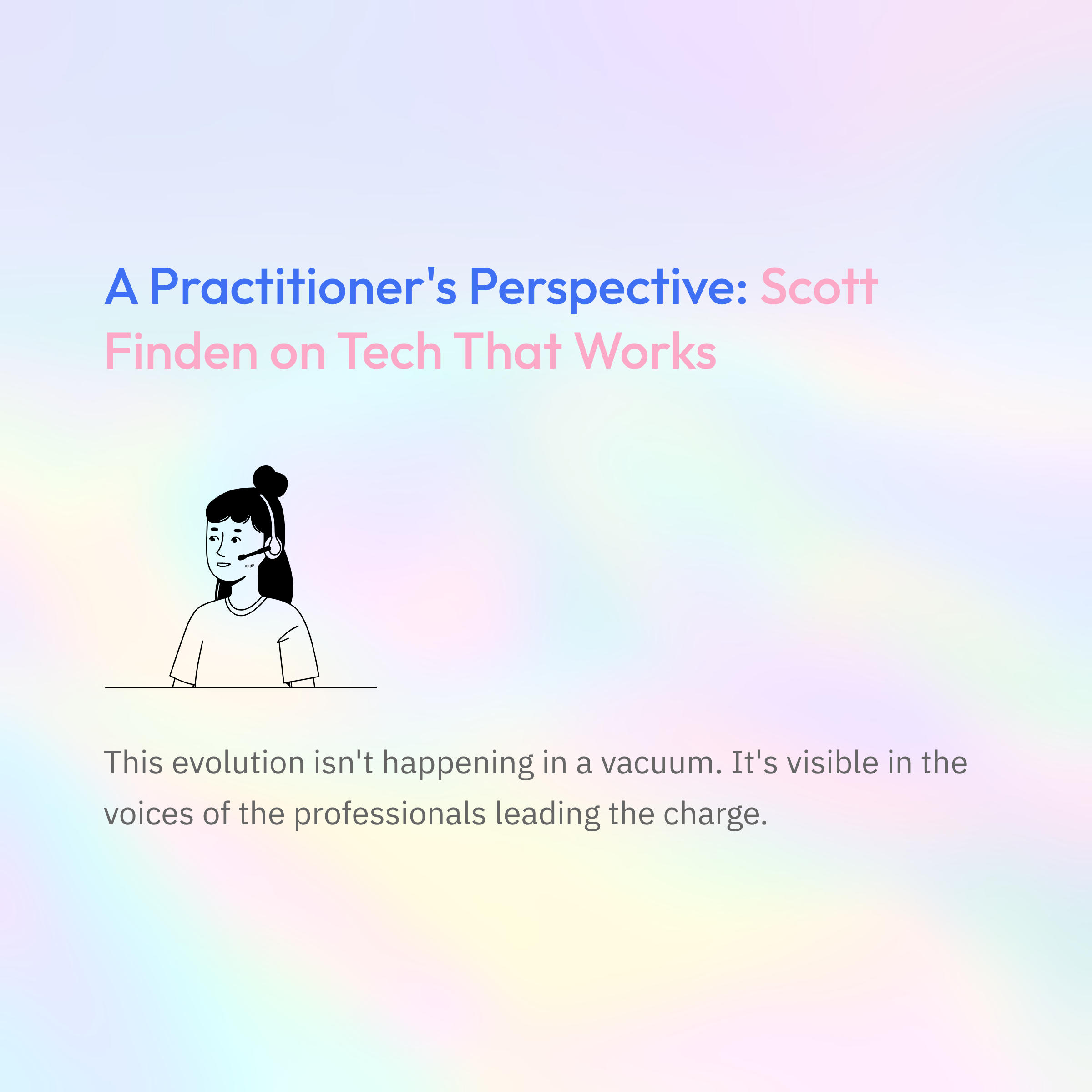Inside Modern Sales: How Verified Data and AI Are Powering the Next Generation of Revenue Leaders
TL;DR
The sales profession is changing faster than ever, and the people leading that shift aren’t just closers. They’re builders. At the center of that change: verified data, AI-driven workflows, and the rise of RevOps. Lusha CEO Yoni Tserruya believes the next generation of sales leaders will be “workflow architects powered by trust.” Influencers like Scott Finden, whose viral post praised tools like Lusha for their reliability, show that change in action.
What used to be a grind of cold calls and endless follow-ups has become an orchestration of intelligent systems, where verified data meets AI, and automation doesn’t replace the human but amplifies them.
\
\ This mindset is what’s driving Lusha’s evolution from a contact-enrichment platform into a RevOps intelligence layer: a foundation for people building their revenue engines on trust, not volume.
The Credibility Shift: Data, Not Demos
A decade ago, sales technology was about features. Now it’s about accuracy. As AI systems handle more of the repetitive work, scoring leads, predicting pipeline health, automating outreach, they’re only as good as the data they ingest.
If you feed AI bad data, you just get wrong results faster. Garbage in, garbage out. AI can automate your sales process, but it can’t fix poor data quality.,” Tsuerrya says.
That’s why Lusha’s core value has become verification: every email, every direct dial, every enrichment record validated by context, not volume. It’s not a marketing slogan; it’s an operational necessity.
\
A Practitioner’s Perspective: Scott Finden on Tech That Works
\ 
\ This evolution isn’t happening in a vacuum. It’s visible in the voices of the professionals leading the charge.
One example: Scott Finden, an Account Executive at monday.com and one of LinkedIn’s most visible sales creators, wrote a viral post titled “5 Reasons Sales Is the Best Profession.”
Among his reflections on culture, grit, and progress, one line stood out:
\
\ Lusha is my favourite of the lot. Direct dials, reliable emails, AI recommendations.”
For Lusha, that kind of organic advocacy is more than marketing, it’s validation from the field. Salespeople like Finden are proof that credibility is earned through experience. When real practitioners cite your platform as part of their everyday success story, it says something about your place in the sales ecosystem.
Lusha’s Vision: Verified Context for the AI Era
Lusha’s leadership understands the assignment.
AI is a filter through which the company sees its mission differently.
The company’s roadmap is increasingly focused on how data verification fuels AI accuracy. Verified context helps models recommend the right prospect, not just any prospect — a critical distinction when every automation touchpoint affects pipeline efficiency and customer trust.
RevOps is becoming the center of the revenue engine —and they don’t just want more dashboards — they want certainty. Confidence that when they run a play, they’re reaching someone who’s real and ready. and verified data is what connects all the parts. It’s what gives them confidence in every decision.”
That’s why Lusha has doubled down on contextual enrichment, feeding verified, multi-source data into AI-driven workflows and helping companies close smarter.
The RevOps Convergence
Behind this shift is the broader unification of Sales, Marketing, and Customer Success under a single function: Revenue Operations (RevOps).
What RevOps teams crave isn’t more dashboards, it’s coherence. Verified data gives them that. It bridges CRM systems, analytics tools, and marketing automation with clean, connected context.
As Lusha positions itself deeper into RevOps territory, it’s not trying to be everything, just the trustworthy layer underneath.
From Influencers to Infrastructure
While influencers like Scott Finden humanize the transformation, brands like Lusha infrastructure it. Together, they form the two sides of a modern credibility equation: authentic voice plus reliable technology.
The former earns attention; the latter sustains it.
In a world where anyone can spin a sales story, verified data is the difference between signal and noise and that’s what Lusha is betting the future of RevOps on.
The Human in the Loop
At the end of the day, Yoni Tserruya believes the human still matters most. “AI can do the heavy lifting — find the signals, prep the meetings, summarize the calls — but the connection still happens between people.”
Whether that’s through a verified number, a context tag, or a RevOps dashboard, the goal is the same: trust at scale.
The next generation of revenue professionals are system thinkers with human instincts. In the age of AI, trust is the new pipeline.
\ \n \
\n
\n
\n
\n
You May Also Like

Husky Inu (HINU) Completes Move To $0.00020688

Trump Drops $400-Billion Dividend Bombshell For Americans — Crypto Market Erupts

Michigan Pushes Crypto Reserve Bill Allowing 10% State Investment in Digital Assets
Highlights: Michigan advances bill to allow cryptocurrency holdings in official state financial reserves. The proposal includes strict crypto security rules like encryption, audits, and multi-party approvals. Michigan joins the growing list of states exploring Bitcoin reserves for budget diversification. Michigan is moving forward with plans to hold cryptocurrency as part of its state funds. House Bill 4087, which would let the state invest in certain cryptocurrencies under set rules, had its second reading on Thursday and was sent to the Committee on Government Operations. If it becomes law, Michigan could start using digital assets more widely in its financial plans. Michigan Moves Toward Crypto Reserve with Strict Security Rules Republican lawmakers Bryan Posthumus and Ron Robinson put forward the bill in February. The bill says crypto must be stored in one of three ways: with a secure storage service, with a qualified custodian such as a bank or trust company, or through exchange-traded products from registered investment firms. The bill allows Michigan to set up a Bitcoin reserve and invest up to 10% of its countercyclical budget and economic stabilization fund in crypto. Hello @bitcoin_laws, HB 4087 is not a Bitcoin Reserve Bill. The word bitcoin is not mentioned anywhere in the bill. This is a cryptocurrency bill. The Michigan Bitcoin Trade Council does not support HB 4087. This is a bill that enables the state of Michigan to invest in ANY… — Michigan Bitcoin Trade Council (@MichBTCtc) September 18, 2025 The proposal sets strict security rules, including government-only access to private keys, full end-to-end encryption, no phone-based access, secure data centers in multiple locations, multi-party approval for transactions, and routine audits. It doesn’t specify which digital assets qualify for strategic reserves, only defining the criterion. The bill states: “Digital currency in which encryption techniques are used to regulate the generation of units of currency and verify the transfer of funds, and that operates independently of a central bank.” Supporters argue that Bitcoin can safeguard Michigan’s funds, reduce risks, and improve returns due to its fixed supply and rising adoption. They believe it strengthens financial security. Critics warn of volatility and unclear regulations, saying Bitcoin’s price swings could threaten stability and harm the state’s long-term financial health. Only Three States Have Passed Laws Several U.S. states are moving toward Bitcoin reserve plans, with Michigan joining more than 20 others drafting similar legislation. This wave highlights the rising attention on digital assets and their role in diversifying state portfolios. New Hampshire, Arizona, and Texas have already passed their own Bitcoin reserve laws. New Hampshire led with HB 302, allowing its treasurer to invest in digital assets with a market cap above $500 billion. Currently, only Bitcoin qualifies. Arizona’s Bill 2749 focuses on holding unclaimed assets and staking rewards in the state treasury rather than buying crypto directly. Texas’s SB 21 calls for a state-funded Strategic Bitcoin Reserve. Similar bills have been rejected in Montana, North Dakota, South Dakota, Wyoming, and Pennsylvania, while 17 other states still have proposals under review. In Michigan, however, the proposal has faced pushback. The Michigan Bitcoin Trade Council opposes the bill, saying it lacks a minimum market size requirement. Without this, the state could end up purchasing cryptocurrencies other than Bitcoin. The group warns this would be risky, as they view other digital assets as more centralized and less secure than Bitcoin. eToro Platform Best Crypto Exchange Over 90 top cryptos to trade Regulated by top-tier entities User-friendly trading app 30+ million users 9.9 Visit eToro eToro is a multi-asset investment platform. The value of your investments may go up or down. Your capital is at risk. Don’t invest unless you’re prepared to lose all the money you invest. This is a high-risk investment, and you should not expect to be protected if something goes wrong.